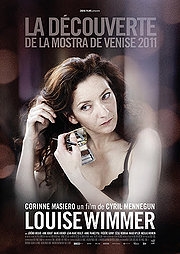Louise Wimmer

It’s always interesting to see how documentary film-makers cope with the transition to making features. Cyril Mennegun’s debut retains many accents which identify it as such a film – the shaky camerawork, abrupt cuts and lack of extradiegetic music all mark this out as no ordinary drama. However, Louise Wimmer is very, very much more than just a pseudo-documentary; although if all documentaries had to include the sensational Corinne Masiero they might be more popular.

From the moment Louise (Masiero) wakes, dresses and drives to work without having to leave her car, it’s evident that things are not as they ought to be for her. Since leaving her husband Louise’s life has steadily come apart at the seams – now pushing fifty, she’s reduced to living in her car and dashing between a number of cleaning jobs while she waits… and waits… for a council flat. Her sole moments of respite come when she’s sitting in the bar which receives her post, discreetly showering at one of her employers’ houses or having passionate, anonymous sex with a nameless man in a hotel room.
As Louise’s financial situation becomes more and more dire, the constant pressures of her miserable life seem increasingly acute. Dodging creditors and bailiffs, trying to keep clean and struggling to subsidise her inevitable moody cigarette habit, it’s all she can do to keep her head above water while she waits for her next rejection letter from the Housing Department. But the kindness of a couple of relative strangers take the edge off her predicament, and in any event it’s all bound to be alright in the end. Isn’t it?

Nothing really happens in Louise Wimmer. That’s fine, though, because by and large nothing happens in real life, and if there’s one thing this film is it’s a superbly realistic study of the mundanity, repetitiveness and sheer bloody tedium of most of our everyday existences. The minutiae of Louise’s routine – get up, coax the car to life, go to work, worry about money, go to work again, steal a shower, check the post, go to sleep – scarcely vary from day to day, effortlessly drawing the viewer into her world and, crucially, letting us feel how plodding and boring it all is for Louise without making us feel that way ourselves.
Certain plot points are a bit laboured, but only in the same way that one would expect an otherwise good documentary to capitalise on its most emotional aspects; it’s a very forgivable flaw, and one that you might not even notice once you’re faced with Corinne Masiero. A TV veteran with relatively few films to her credit, Masiero is nevertheless astonishing as/in Louise Wimmer, holding the film together with her patient, dignified and constantly frustrated quest for security and dignity. The other performances were all fine, but they are of absolutely no importance – this is Corinne’s show through and through.

Oddly enough, my favourite aspect of Louise Wimmer might have been the music. Shunning a soundtrack in favour of simply using the music of car stereos – which, in Louise’s case, means a permanently jammed-in tape of Sinnerman by Nina Simone – is a stark, brilliant touch which takes something wonderful and artistic and, without compromising its beauty, makes it demonstrate the grinding Sisyphean inevitability of life. The same could be said of Corinne Masiero’s performance; or, indeed, of this exquisite film.

Recent Comments